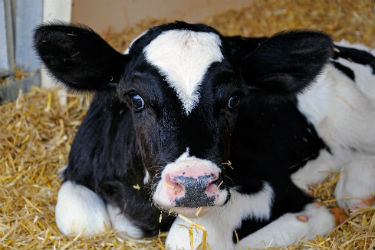Veterinarian Tips: Fat Cow Syndrome

A nutritional disease of ruminants, fat cow syndrome often occurs as the result of over-conditioning during the late lactation and dry periods. Cows with fat cow syndrome are often first noticed when seen standing amongst other dry cows.
Cause of Fat Cow Syndrome
Also referred to as fatty liver disease, the cause of fat cow syndrome has not been established, but it is believed to develop due to faulty feed management methods that allow for an excessive consumption of unbalanced diets. Progression of the disease occurs in obese cattle before and during parturition.
Disease development is considered to be associated with:
- Endocrine changes that occur:
- After calving
- With the onset of the production of milk
- Time when feed intake is decreased.
Signs of Fatty Liver Disease
The syndrome has no unique clinical signs, but one distinctive indication is an overly fat cow. Other disease characteristics include, for example, the presence of:
- Inappetence
- Depression
- Lowered milk production
- Excessive loss of body condition
- Progressive debilitation
- Weakness
- Nervous
- Elevation in temperature
- Reduced fertility and poor reproductive performance
- Greater incidences of:
- Milk fever
- Ketosis
- Clinical mastitis
- Retained fetal membranes
- Blood test results that show elevated levels of nonesterified fatty acid concentrations (NEFA) and increased ketones.
Diagnosis of Fat Cow Syndrome
The signs and symptoms of the disease resemble other diseases, causing fatty cow syndrome to often be misdiagnosed. Diagnosis is usually made when the cow:
- Is observed to be off feed
- Has died, usually as the result of a different complication.
Treatment of Fat Cow Syndrome
There is no proven treatment for the disease. While there are methods to treat similar diseases in nonruminants, they have not been proven effective in cattle. Steps to take to treat the animal include providing good supportive care and feeding the animal a balanced diet, such as:
- High-quality hay with little or no grain in the early stages of the drying-off period
- A vitamin and mineral supplement to fulfill nutritional requirements for:
- Protein
- Energy
- Calcium
- Phosphorus
- Selenium
- No high-calcium grain mixes until after calving.
Prevention of Fatty Liver Disease in Cows
To reduce the incidence of fat cow syndrome, it is recommended to avoid:
- Over-conditioning cows by establishing herd management methods to ensure that cows maintain the correct body condition. The ideal body condition score when at calving stage is 2.5 to 3. When drying off, cows should be at this score, and weight should be maintained throughout the dry period
- Rapid diet changes
- Unpalatable feedstuffs
- Environmental stress by minimizing changes that could increase stress. For example, stay clear from making changes to:
- Feed rations
- Herd mates
- Housing
- Temperature.
This disease can have an economic impact on a farm. The syndrome not only affects milk production, but the animals often suffer from various metabolic and infectious diseases. Animals that develop fatty liver often end up culled from the herd.
At Covetrus, we believe the more information veterinarians provide clients, the more likely your clients will return. Here’s some additional information to pass on to your clients who have dairy cattle—Dairy Cattle Udder Hygiene.
For you, the veterinarian, Covetrus offers this free white paper, Obstacles and Opportunities Facing Livestock Veterinarians.
Contact your Covetrus representative for additional information to help clients with dairy herds online or at 855.724.3461.
Need Regulatory Assistance
If you need help with regulatory or licensing issues, we're happy to help. We have a wide variety of resources to help you when issues arise.

Careers
Are you looking for a place to let your talents shine? At Covetrus, we help our practitioner customers better serve their patients and take pride in providing the best customer experience possible. Search our open positions to see our available opportunities.
Newsletter
Stay current with what’s going on with Covetrus, subscribe to receive our newsletter and email communications. Subscribers will receive the latest information in practice management, sales and marketing, animal health, and more.


Leave a comment